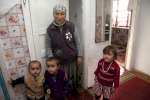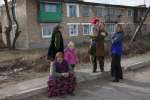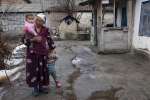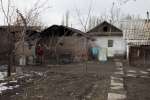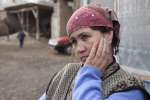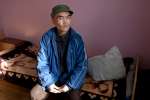- Text size
 |
|  |
|  |
| 
- عربي
Statelessness: UNHCR helps indigenous people without frontiers in Central America
News Stories, 7 May 2015
SABALITO, Costa Rica, May 7 (UNHCR) – Elida Andrade has lived in the green hills around the small southern Costa Rican town of Sabalito for her whole life, but until recently the 18-year-old mother never really belonged anywhere.
Her parents, members of the indigenous Ngöbe Bugle people, were born across the nearby border in Chiriqui, Panama, and moved to the coffee-growing Sabalito area when they were teenagers, like many others of their group. They did not think about borders and the legal implications of moving across them because their ancestral territories straddled both countries.
In Sabalito, Elida's parents worked on coffee plantations. It was seasonal work, but like many others they settled in Sabalito and raised a family of six children, including Elida. But although she and her siblings were all born in Costa Rica, none had had their birth registered. As they grew up, this would have far-reaching consequences for them and other indigenous children.
"We had no documentation to prove that we were Costa Ricans and great difficulties in accessing our rights [including access to education and health care]," Elida recalled. The greatest concern, however, was that failure to register made it difficult for her and some 1,200 other Ngöbe Bugle children in Costa Rica to get a birth certificate, and this in turn put them at risk of statelessness.
"This is serious because birth registration is key for the prevention of statelessness," stressed Roberto Mignone, UNHCR's representative in Costa Rica. "Birth registration is fundamental to advance children's protection."
To help these young people, the UN refugee agency and such partners as Costa Rica's Supreme Electoral Tribunal and the UN Children's Fund (UNICEF), launched a project in late 2014 to determine their nationality, register their births and clear the way to Costa Rican nationality and the rights it brings.
Mobile teams were sent to more than 2,000 remote coffee farms for case identification and registration. As a result, in the first five months of the project, more than 300 indigenous children had their nationality determined, including the registration of several dozen births.
Meanwhile Elida, with UNHCR guidance, registered herself with the Costa Rican Registrar Office. "My late registration went through, and I got my Costa Rican documents," she told UNHCR, adding: "That day was one of the happiest days of my life. I now feel like a real Costa Rican." She also registered the birth of her one-year-old son, Pablo, not wanting him to go through her experience.
Under the Costa Rican constitution, anybody born in the country, regardless of the nationality of their parents, has the right to citizenship under the legal principle of jus soli (literally right of the soil) – getting nationality on the basis of birthplace rather than parentage. They can be registered as Costa Ricans by their father or mother when minors or, like Elida, they can self-register until the age of 25.
The case of the Ngöbe Bugle was more complex because many crossed from Panama as part of their traditional way of life in what they regarded as ancestral territory and later gave birth in remote coffee plantations in Costa Rica and never registered the birth of their children, which would have established place of birth, parental affiliation and proof of age as well as serving as important documentary evidence to acquire the nationality of the state in which the child was born, or the parents' nationality.
UNHCR and Costa Rica signalled their determination to work together in 2013, when the refugee agency forged a cooperation agreement with the Supreme Electoral Tribunal to promote effective access to nationality and naturalization for stateless people as well as to provide training on nationality legislation and international provisions related to statelessness.
The refugee agency, in line with its global #IBelong campaign to end statelessness by 2024, has also supported the authorities in identifying people at risk of statelessness and by providing legal assistance to the Ngöbe Bugle people in their nationality determination and late registration procedures.
Back in Sabalito, meanwhile, Elida is finishing secondary school and planning for her future. "This was the first year that I could enrol with my own documents, and I will finally get my diploma, like the other students in my class," she said.
She plans to study medicine at university, previously an impossible dream. "I will be the pride of my parents and my community. In the meantime, I will promote birth registration so that all my people can assert their rights. The future is ours."
By Marcela Rodriguez-Farrelly in Sabalito, Costa Rica













